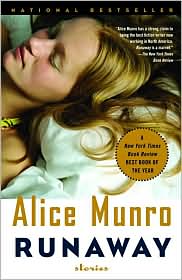Runaway, Alice Munro.
Acquired: used, probably late 2007 or early 2008, Bookshop Santa Cruz.*

*One of my favorite book stores, along with Diesel and Pegasus/Pendragon.
I was drawn to Alice Munro for a few reasons. She has the respect of a good friend and literophile (a word which many other people seem to have made up, like me, and which probably has a "real" word counterpart that this friend knows), whose opinion I take with all seriousness. I had also read one of her stories in a collection edited by David Sedaris:
Half a Grapefruit was published in
Children Playing Before a Statue of Hercules. It's a really nice collection of stories, and it includes many other very talented authors: Flannery O'Connor, Joyce Carol Oates, Jhumpa Lahiri, Sarah Vowell, others. Now that I think about it, and now that I'm thumbing through that book, I don't know if I ever finished it. I may have to add it to this project. One of the curses of short story collections is that they're easier to set aside than a book whose resolution hasn't come yet; collections have resolutions roughly every 50 pages.
Back to
Runaway. I really, truly loved reading these stories. Munro brings forth all of my favorite qualities in a short story, over and over. She includes details that might be mundane, but which ground you in the character's perspective that much better. Her characters have flaws, not big Hollywood flaws but real flaws that real people have. I could see how a superficial reader, or someone looking for the next Da Vinci Code, would complain that nothing happens in her stories. And that is true, on some level. On another level, everything happens. So much happens that she can't put words to it all, there aren't words to describe it. There's a feeling that I can only describe as "life happening," which I've encountered in certain books or films, and more often in daily life when something painfully, awkwardly beautiful happens. That's the feeling I find in her stories. Something rich, magnetic, profound and rumbling deep beneath the actual words on the page -- she manages to evoke that. It gives me shivers just thinking about it.
I didn't realize before picking up this book that she's Canadian, too. The setting in her stories ranges from the 50's/60's to very contemporary. The way she writes about Canada is so similar, yet faintly different, from the US... and compound that with times that are so similar, yet just a little different, to our own time -- I feel like I'm watching a slightly ethereal parallel universe, or maybe watching scenes in our own dimension through a silk screen that's a little foggy, and which makes herringbone patterns sometimes appear where there are none.
Several of her stories are about the same woman, Juliet, and her life from striking out on her own, to starting her own family in the way that's right for her, to ending up estranged from many of the people and places that once defined her. This one woman reminds me of so many women that I've known - my mother, myself, my friends - and even where she succeeds she is also struck by loss and failure. I could read volumes about her.
I'm so excited about this book, I feel like I could write a novel about it. But I'm going to stop myself, for now. No promises that I won't come back later and add on some more thoughts...
-----
Next up: undecided! Crap!


